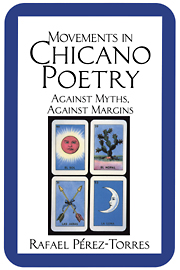Book contents
- Frontmatter
- Contents
- Acknowledgments
- 1 Introduction: Movements in a “Minority” Literature
- PART I THE POSTCOLONIAL
- PART II THE POSTMODERN
- 5 Migratory Readings: Chicana/o Literary Criticism and the Postmodern
- 6 Mythic “Memory” and Cultural Construction
- 7 Mouthing Off: Polyglossia and Radical Mestizaje
- PART III CONFLUENCES
- Notes
- Works Cited
- Index
- CAMBRIDGE STUDIES IN AMERICAN LITERATURE AND CULTURE
6 - Mythic “Memory” and Cultural Construction
Published online by Cambridge University Press: 17 September 2009
- Frontmatter
- Contents
- Acknowledgments
- 1 Introduction: Movements in a “Minority” Literature
- PART I THE POSTCOLONIAL
- PART II THE POSTMODERN
- 5 Migratory Readings: Chicana/o Literary Criticism and the Postmodern
- 6 Mythic “Memory” and Cultural Construction
- 7 Mouthing Off: Polyglossia and Radical Mestizaje
- PART III CONFLUENCES
- Notes
- Works Cited
- Index
- CAMBRIDGE STUDIES IN AMERICAN LITERATURE AND CULTURE
Summary
As long as the world will endure, the fame and glory of Mexico-Tenochtitlán will never perish.
– Domingo Chimalpahín CuauhtlehuanitzinLike a persistent dream that returns vaguely during daytime, the notion of an ancestral memory has haunted contemporary Chicano cultural production. The claim for rights and land, intensified during the political activism of the 1960s, brought with it a re-collection and re-valuation of indigenous cultures both contemporary and pre-Cortesian. The procession of campesinos in Delano who walked from the grape fields into the stark sunlight of history marched – just as their ancestors had since el Grito de Dolores in 1810 – behind both a firm sense of justice and the outstretched banner of Our Lady of Guadalupe. This connection to a Mexican political past resonates with a spirituality invoked by the beneficent presence of the Virgin. The Virgin of Guadalupe also evokes a more distant spirituality since the image of the Virgin represents a postconquest confluence of pre-Cortesian and European religious imagery. Ancestral “memory” thus merges with mythic “memory,” and a central trope in the articulation of Chicano culture emerges.
Whereas folk-legend and indigenous cultural practices form a living cultural memory for many Chicano writers – one thinks immediately of Rudolfo Anaya and Jimmy Santiago Baca, to name but two – the “recollection” of Mexica and (less commonly) Mayan myths and images by Chicano poets employs pre-Cortesian cultures and values as a foil, as a rejection of the most pernicious influences of the Enlightenment and capitalism, as a source of alternate and empowering forms of social organization, as a dream for contemporary Chicano life.
- Type
- Chapter
- Information
- Movements in Chicano PoetryAgainst Myths, against Margins, pp. 172 - 207Publisher: Cambridge University PressPrint publication year: 1995



